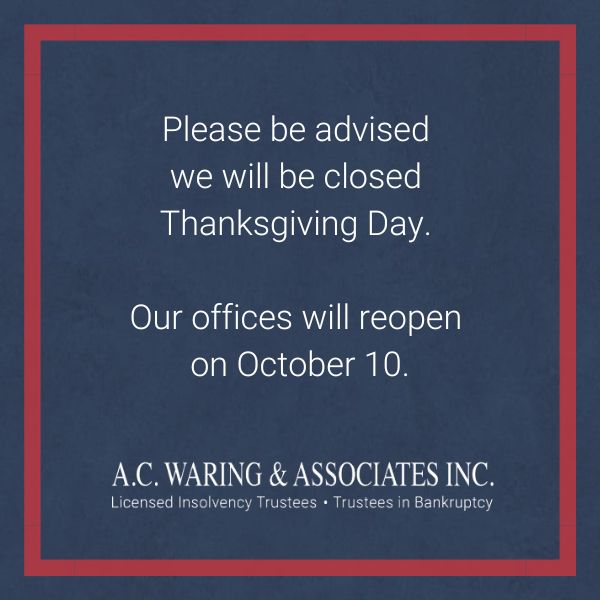The average Albertan carries about $25,000 of debt—the culmination of student loans, car loans, mortgages, credit card balances, and so much more.
You’re going to have to face these debts at one point or another, and the difference between paying them off and struggling with your finances is having a sound repayment strategy. If you’re unsure what your debt repayment plan should look like, we’re happy to give you the tools you need to create a plan that works best for you, no matter what type of debt you have.
At A.C. Waring & Associates, we believe anybody can pull themselves out of seemingly insurmountable debt by sticking to a plan. However, if you’re unsure where to start managing your finances, we can help by offering comprehensive credit counseling sessions to give you a better understanding of what debts you may owe and how they’re affecting your life.
If you’re interested in how our credit counseling could help you, please call our team today.
Know What You Owe & What You’re Paying
The first step in creating a debt repayment plan is to list your debts and how much you owe for each one. Most people will have debts like:
- Credit card balances
- Mortgages
- Car loans
- Student loans
- Tax debts
Once you have the list of debts you owe, your next step is to prioritize them according to how much you owe, your monthly payments, and how much interest the debt may have.
Now that you know what you owe, who you owe it to, and how much it costs you a month to make your monthly payments, you can start looking at the details and form your repayment plan.
But before you can start paying off your debts, you’ll need to have a monthly budget to see how much you need to live comfortably while also paying off your debts.
Creating a Budget
Calculating your monthly budget is quite simple and integral to building a debt repayment plan. To calculate your budget, you’ll need to:
- Add up what your monthly income is
- Add up your monthly expenses (groceries, gas, utilities, subscriptions, etc.)
- Add up your monthly debt payments
- Calculate what your leftover income is
If you have a negative balance once you add your monthly expenses to your income, you’ll need to start thinking about reducing these costs as much as possible. Relying on credit to live and pay off your debt will only put you in a deeper financial hole. If this happens to you, you may have to choose from filing for bankruptcy and submitting a consumer proposal to help get your finances back on track.
Picking a Method to Payback Your Debts
There are a number of ways to pay back your debts, but we’re going to look at the 2 most common strategies: the snowball and avalanche methods.
You might’ve heard about these methods before when we wrote about paying off multiple credit cards, but these are still effective strategies for paying off all kinds of debts. You can determine which one is best for you once you have an idea of all the debts you may have.
The Snowball Method
The snowball method is about paying off the smallest debt you owe first while making the minimum payments for your other debts.
You may choose the debt with the smallest balance or the debt with the smallest interest rate, but the idea here is to get you to tackle debts quickly. Once you pay off one debt, you can snowball your savings into the next highest debt and so on and so forth.
The Avalanche Method
The avalanche method is the opposite of the snowball method: instead of tackling your smallest debts first, you’ll pay off your largest debts while making the minimum payments on all your other debts.
What’s great about the avalanche method is that once you’re paid up on your most expensive debt, you should free up a lot more money in your monthly expenses to pay off other debts, creating an “avalanche” of payments.
Once the avalanche starts, it could pay off your debts quickly, but it could take a while before you see progress.

Take Advantage of Debt Repayment Programs
If you have a lot of debt, you could look for specific repayment programs to help you organize your finances and make it easier to follow a repayment plan.
Some methods can include:
Debt Consolidation
Debt consolidation is the process of combining multiple debts into one monthly payment. You’ll need help from a bank, credit counselor, or financial institution to consolidate your debts.
Doing so can help lower your monthly expenses and possibly lower interest rates for multiple debts.
Debt Settlement
In some cases, you might be able to renegotiate your unsecured debt into a lower lump sum payment with a process known as debt settlement. However, it’s important to know that there are a number of fees associated with renegotiating a loan, so always be prepared to pay more than what your new loan may be.
Government Programs
Depending on the type of debt you have and your eligibility, you could take advantage of some government repayment programs. For example, people with student loans may apply to the Repayment Assistance Plan (RAP).
This program reduces your monthly student loan payment to something more manageable based on your monthly income and family size, while the government pays your loan interest. This program can last for up to 60 months, but you’ll need to reapply for the program every 6 months.
What to Do When Your Repayment Plan Fails?
If you fall behind on your payments or deviate too much from your debt repayment plan, you may become overwhelmed with debt again. If you have no way to pay back your debts or even maintain your minimum monthly payments, you may need to consider other options like bankruptcy or a consumer proposal.
But there is always a light at the end of the tunnel. If you’re struggling with your debts and aren’t sure where you should start managing your finances, your first step should be getting help. Our credit counseling is ready to help you take control of your money; all you have to do is contact us today.





